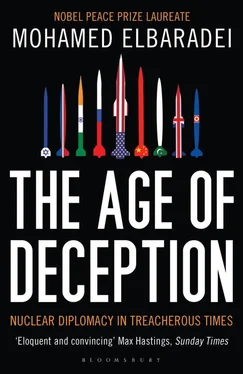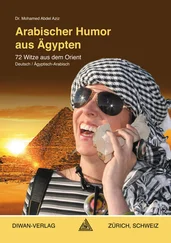It was later claimed (by NBC Nightly News and 60 Minutes ) that Sabri was an intelligence source for the CIA. In any case, when the war began, Sabri was not on the list of the fifty-five most-wanted Iraqis, and as soon as possible he quietly left Iraq to resettle in Qatar.
Ramadan was later placed on the U.S. list of most-wanted Iraqis. He was captured in August 2003 and executed in March 2007.
September 8, 2002. This was the same appearance in which Rice, with a first-rate bit of melodrama, coined the phrase “We don’t want the smoking gun to be a mushroom cloud.”
Haroun al-Rashid, who ruled the Arab empire from Baghdad in the late eighth century, is a historical figure of mythic stature, considered the greatest of the Abbasid caliphs. Al-Rashid’s reign was marked by extraordinary cultural, scientific, and political prosperity.
David Barstow, William J. Broad, and Jeff Gerth, “How the White House Embraced Disputed Arms Intelligence,” New York Times , October 3, 2004.
In President Bush’s memoir, Decision Points, he writes that Mubarak had told U.S. general Tommy Franks that “Iraq had biological weapons and was certain to use them on our troops.” This information, Bush writes, influenced his thinking on Iraq’s WMD status and the need for military action. Quoted in Diaa Bekheet, “Bush: Mubarak Informed U.S. that Iraq Had Biological Weapons,” Voice of America, November 11, 2010. Retrieved from VoANews.com , at www.voanews.com/english/news/Bush-Says-Egypts-Mubarak-Informed-US-that-Iraq-Had-Biological-Weapons-107247693.html.
Many U.S. leaders characterized the French position on the Iraq war as disloyalty; members of Congress went so far as to demand that French fries and French toast on the House cafeteria menu be renamed “freedom fries” and “freedom toast.”
Screwworms are flesh-eating pests that have largely been eliminated from North America and other regions using the “sterile insect technique,” in which healthy male flies are irradiated, making them sterile, and then released into the environment to mate. Since the females can breed only once in their lifespan, this rapidly cuts down on the screw-worm population. The IAEA has helped many countries develop the capacity to use this technique for screwworms and other pests. Iraq had an inventory of screwworms in storage for this purpose.
A dirty bomb, otherwise known as a “radiological dispersal device,” is a low-tech device that could be used by extremist groups. Essentially, it consists of conventional explosives wrapped around nuclear or radioactive material. The result would not be a nuclear detonation, but still could effectively disperse the material across, for example, several city blocks, contaminating the area and causing widespread panic and economic disruption.
William J. Kole, “Experts Say U.S. ‘Discovery’ of Nuclear Materials in Iraq Was Breach of UN-Monitored Site,” Associated Press, April 10, 2003.
For example, two articles in the Washington Post , by Barton Gellman, on April 25 and May 4, detailed the haphazard efforts to control known nuclear sites in Iraq.
The last of the sanctions on Iraq were not lifted until December 15, 2010, no longer barring the country, for example, from pursuing a civilian nuclear program, and returning control of oil and natural gas revenues to the Iraqi government as of June 30, 2011. “UN Lifts Nuclear Weapons Sanctions on Iraq,” Associated Press, December 15, 2010.
Later renamed the World Nuclear Association.
HMX and RDX are powerful chemical explosives. Both were controlled by the IAEA because, while they have many nonnuclear applications, they can be used as detonating material for a nuclear weapon.
“Huge Cache of Explosives Vanished from Site in Iraq,” New York Times , October 25, 2004.
From “Osama Casts His Vote,” New York Times, November 1, 2004.
“Rendition,” sometimes referred to as “extraordinary rendition,” is the process of transferring prisoners from country to country outside of judicial proceedings. CIA renditions during this period were rumored to be for the purpose of sending prisoners to countries where torture was practiced. These renditions have been the subject of multiple investigations and reports. An example is the June 2007 report from the Committee on Legal Affairs and Human Rights of the Council of Europe; that report is entitled “Secret detentions and illegal transfers of detainees involving Council of Europe member states: second report.” Retrieved at: http://news.bbc.co.uk/2/shared/bsp/hi/pdfs/marty_08_06_07.pdf.
The four Geneva Conventions of 1949 and their Additional Protocols are at the core of international humanitarian law, the body of international law that regulates the conduct of armed conflict and seeks to limit its effects. They specifically protect people who are not taking part in the hostilities (civilians, health workers, and aid workers) and those who are no longer participating in the hostilities, such as wounded, sick, and shipwrecked soldiers and prisoners of war. The UN Security Council concluded in 1993 that the conventions had become part of customary international law, making them binding on all countries, including nonsignatories.
Richard Haass is the current president of the Council on Foreign Relations and, at the time of the Iraq invasion, was a close adviser to Colin Powell. His article appeared in Newsweek on May 2, 2009. His book, War of Necessity, War of Choice: A Memoir of Two Iraq Wars, was published by Simon and Schuster in 2009.
In testimony to the Chilcot inquiry, Blair said that his support for the U.S. action was prompted by the fear of “disastrous consequences for a tough stance on WMD and its proliferation—and for [the UK’s] relationship with the U.S.” Blair also described telling Bush in late 2001 that “if [regime change] became the only way of dealing with this issue, we were going to be up for that.” In mid-2002, when Colin Powell wrote in a memo that “We need to make the case…. We need to have the sort of Rolls-Royce information campaign we had at the end of Afghanistan before we start in Iraq,” Blair added in the margin, “I agree with this entirely.” Richard Norton-Taylor, “Tony Blair’s Promise to George Bush,” Guardian, January 21, 2011, retrieved at www.guardian.co.uk/politics/2011/jan/21/tony-blair-george-bush-iraq/.
If the prosecutor of the International Criminal Court were to issue an indictment against specific individuals, then any country party to the convention could legally arrest them if they traveled to that country.
IAEA inspectors were there to verify that North Korea was not reprocessing its spent fuel into plutonium, but the Agency’s verification activities were limited in scope to the declared facilities subject to the freeze.
Vice Marshal Cho Myong Rok, regarded as Kim Jong Il’s second in command.
Jake Tapper, “Did Bush Bungle Relations with North Korea?” Salon, March 15, 2001.
Читать дальше












